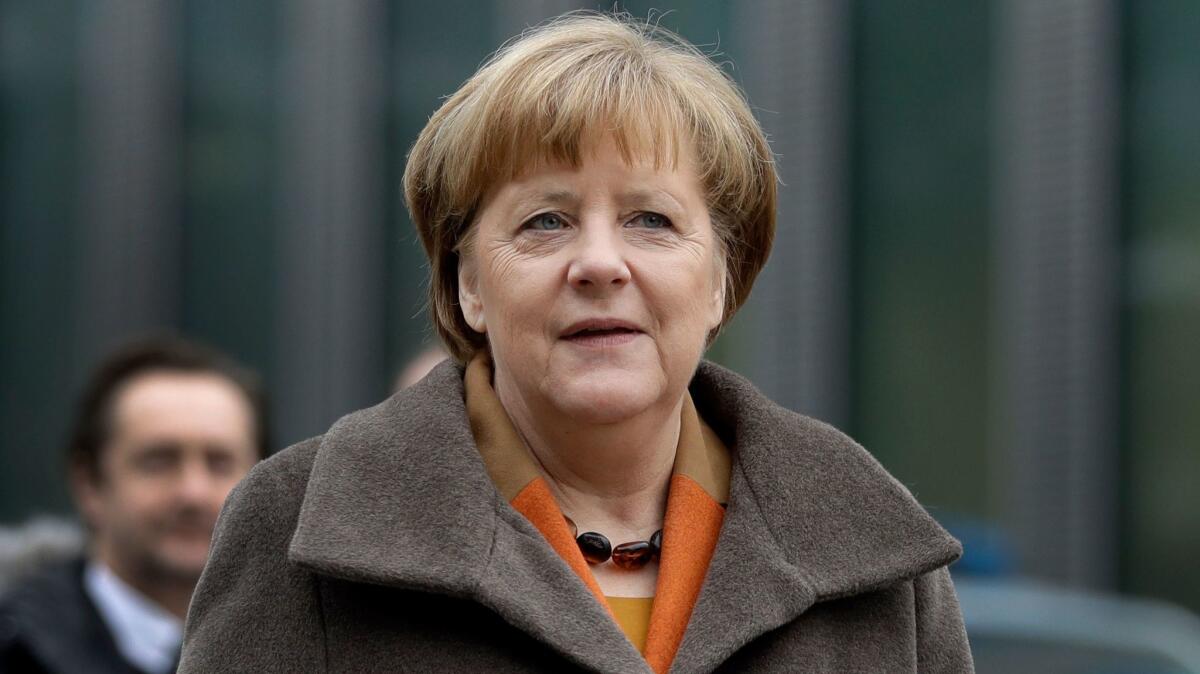Op-Ed: Will Pax Germania replace Pax Americana?

- Share via
German Chancellor Angela Merkel is the very model of Teutonic stolidness. She doesn’t always smile in photo ops. She’s not constantly tweeting; she doesn’t traffic in outrage. Instead, she simply gets on with leading the most powerful country in the European Union.
With bombast and bluster in ascendance on the world stage, her manners seem almost quaint. In her workmanlike way, however, Merkel could oversee a truly consequential change in foreign affairs, a shift from Pax Americana to Pax Germania. The role of guardian of the “liberal world order” — tamping down national egoism, promoting peace — isn’t one Germany has sought, but it may be one it can’t avoid.
Merkel and the EU face enormous challenges. She is up for reelection in September, as opposition parties in Germany gain ground and a corrosive nationalism rises across the continent. Germany is grappling with 1 million refugees from the fractured Middle East. Britain is “Brexiting.” Russian President Vladimir Putin looms on Europe’s eastern flank, and in the West, President Trump rarely misses an opportunity to signal his disdain for the chancellor and what she represents. But don’t count Merkel out.
Merkel’s chancellorship so far embodies the stability Germans have craved since the end of the Nazi era and the founding of the Federal Republic in 1949.
For more than 50 years, Germany and Europe in general have operated in America’s international shadow, building the EU and cooperating with the U.S. on trade and defense. On Sunday, however, the weekly Der Spiegel editorialized that Germans had to prepare for a “painful” reality: standing “in opposition to the 45th president of the United States and his government.”
Trump has forced the issue. He seems to view the EU as a kind of German economic racket, and he has repeatedly referred to the NATO defense alliance as “obsolete.” During the campaign, he deliberately chose the past tense to describe Merkel: “I felt she was a great, great leader.” He calls her refugee policy a “catastrophic mistake,” and his top trade advisor, Peter Navarro, recently accused Germany of exploiting the U.S. and the rest of Europe by “grossly undervaluing” the euro.
Instead of a close relationship with a unified Europe, Trump appears to prefer the map rearranged along the lines of the “grand alliance” during World War II — Russia, Britain and the United States, with America first, of course.
Merkel isn’t blinking. After Trump’s victory, the chancellor sent him a lukewarm message of congratulations and a not-so-veiled warning that the U.S. should honor its agreements and base its ties to Germany on “a common platform of democracy, freedom, advocacy for human rights all over the world and championing the open and liberal world order.”
In direct opposition to Trump, Merkel has become Putin’s foremost public challenger, insisting that sanctions levied against Russia for invading Crimea and fostering war in Ukraine stay in place. A Tuesday phone call between them yielded a joint appeal for an immediate truce in eastern Ukraine. She and Putin continue to circle each other warily.
She is steadfast in her support for the more than 1 million refugees — “illegals” in Trump’s eyes — seeking resettlement in Germany. That policy caused an uproar last year, but recent German poll results show that it hasn’t dimmed Merkel’s chances for reelection. Despite a December terrorist attack in Berlin, in which a refugee killed 12 people, her popularity and that of her party rose slightly in January.
Merkel hasn’t been shy about turning up the heat on Trump. At a recent public reception, she stated that politicians should employ “facts, not fakes” to persuade their electorates. After Trump’s refugee and travel ban, she issued a statement: “The necessary and resolute fight against terrorism in no way justifies a general suspicion against all people who share a certain faith.”
Politically, Trump appears to be making Merkel look better and better at home. Malte Lehming, opinion editor of the Berlin daily Der Tagesspiegel, told me many Germans are convinced that the U.S. is hopelessly adrift: “Merkel is perceived as being the antipode to all of that — reliable, steadfast, knowledgeable, polite.”
The German yearning for such qualities is rooted in the memory of World War II and the Holocaust, which renders overt displays of nationalism and assertions of Teutonic might taboo. Indeed, Merkel has tried to lower her power profile: “No human being on his own … can manage to give the world a positive direction for everything, not even a German chancellor,” she said as she announced her reelection bid in late November.
But that isn’t stopping Merkel from adopting a leadership role. She is taking a hard line with Britian, demanding that London accede to the principle of freedom of movement for workers in its Brexit agreement. At the same time, her economic minister, Sigmar Gabriel, is touting opportunities for collaboration with Asia and China. (Chinese Premier Li Keqiang responded quickly: Berlin and Beijing, he said, should “safeguard the existing international system through trade and investment liberalization.”)
Merkel’s chancellorship so far embodies the stability Germans have craved since the end of the Nazi era and the founding of the Federal Republic in 1949. If she succeeds in defying her political adversaries this fall, and if Trump really does pull back from Europe, she is likely to preside over the creation of a newly powerful Germany.
It is no small irony that the nation the U.S. transformed after 1945 may emerge as the primary standard bearer for universal values its mentor is in danger of leaving behind.
Jacob Heilbrunn is the editor of the foreign policy magazine the National Interest.
Follow the Opinion section on Twitter @latimesopinion and Facebook
A cure for the common opinion
Get thought-provoking perspectives with our weekly newsletter.
You may occasionally receive promotional content from the Los Angeles Times.






